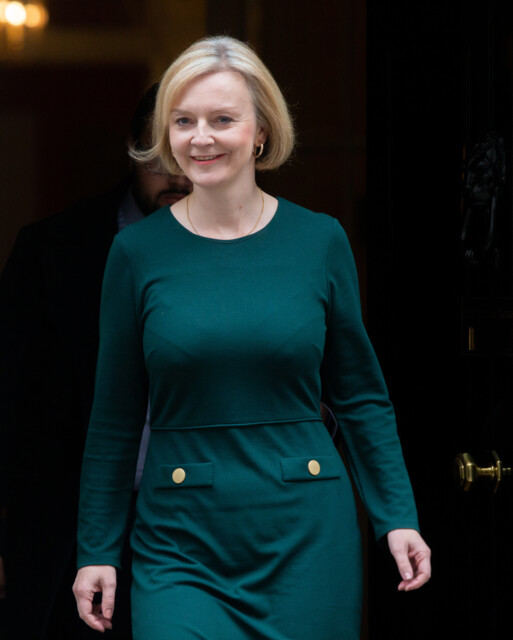
LIZ Truss has vowed she will not slash public spending – despite warnings that £60 billion of cuts are needed to balance the books.
Asked directly by Keir Starmer if she stood by campaign promise of no “public spending reductions” the Prime Minister insisted “absolutely”.
Liz Truss heads to PMQs where she vowed she will not slash public spending – despite warnings that £60 billion of cuts are needed to balance the books
In a fiery PMQs session, Truss hit out: ”We are spending almost £1 trillion of public spending. We were spending £700 billion back in 2010.
“What we will make sure is that over the medium term the debt is falling. But we will do that not by cutting public spending but by making sure we spend public money well.”
But MPs and economists said last night that would leave her no other option but to backtrack on her tax cuts agenda – with growth unlikely to be strong enough to raise Treasury revenues alone.
Downing Street say the penny off the basic rate will go ahead in April, and Rishi Sunak’s planned corporation tax hike “remains cancelled”.
After claims parts of the mini-Budget were going to be reversed, No10 pointed to the fact that the cut to the rate of National Insurance will be enshrined in law shortly.
Truss and Chancellor Kwasi Kwarteng have now received a “dire” draft forecast from the Office of Budget Responsibility. A Downing Street Source said: “Are we going through OBR line by line? Yes. Does that mean we are cancelling things? No.”
But Truss was mocked in the Commons after claiming her government was “protecting our economy at this very difficult time internationally”.
Last night powerful backbenchers said it was time for another u-turn on the tax cuts.
Mel Stride said: “Given the clear government position expressed on protecting public spending… any plan that does not now include at least some element of further row back on the tax package can actually satisfy the markets.”
And ex-deputy PM Damian Green added that Tory MPs were openly discussing another u-turn, adding: “We can all do the rough maths and it’s very difficult.”
He added: “The underlying point is, the government’s policy has to be credible with the markets. That may well involve some changes to policy and the way the Bank of England has performed as well.”
“There are various things you could do and one of the obvious ways – because you do need some big numbers to change – one of the obvious ways would be possibly to defer some of the tax cuts or the failure to put taxes up.”
Despite the public commitment not to cut spending, Ms Truss’s spokesman warned “difficult decisions” would need to be made on spending when asked whether the cost of the energy bailout package would be used as cover for departmental cuts.
“We are clear there will need to be difficult decisions to be taken given some of the global challenges we’re facing,” he said; “I appreciate the interest but I’m not going to get drawn into what those might look like.”
Treasury Chief Secretary Chris Philp told MPs there will be “iron discipline when it comes to spending restraint” but “we do not plan real-term cuts” – indicating that departmental funding will rise in line with inflation.
Meanwhile gloomy economists yesterday rounded on Kwasi Kwarteng’s £45billion tax giveaway as the blame for the market meltdown.
The Resolution Foundation’s Torsten Bell told MPs: “Maybe you could have got away with that in more benign times – it wouldn’t have been a good idea in any times – but you definitely shouldn’t be doing it in the current climate.”
Deutsche Bank’s Sanjay Raja said there was “absolutely” global factors at play but the mini-Budget was the “straw that broke the camel’s back”.
The IFS’ Paul Johnson said the u-turn on the 45p rate does not change the fact that the remaining tax cuts are “giving substantial amounts of money away and most of it is going to people on relatively high incomes.”
Truss has dismissed “vested interests dressed up as think tanks” as part of the Anti-Growth Coalition conspiring to strangle Britain’s economic potential.
Meanwhile the Resolution Foundation said hiking benefits with wages rather than inflation would leave the poorest families with the lowest real terms incomes since the year 2000. Last night Truss faced a stormy session of the backbench 1922 Committee, where MPs rounded on her plans.
Robert Halfon said the PM had “trashed the last ten years of the Tories economic record” and accused of “betraying blue collar conservatism.”
Sunak-ally James Cartlidge accused Truss of being “financially irresponsible” and received applause from fellow Tory MPs.
Another present described Truss’s performance as “worse than Theresa May.”
Meanwhile ex-Chancellor Sajid Javid attacked the government for spending TOO MUCH on the energy bailout – rather than targeting support for bills to the neediest households.







